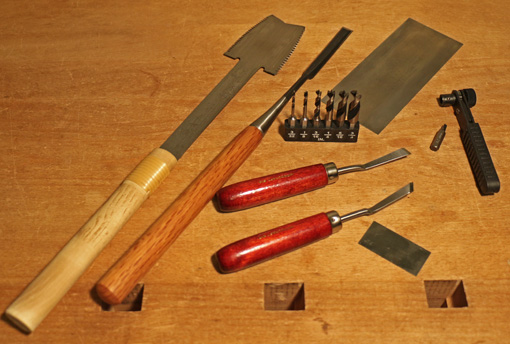
Sometimes in woodworking, especially in unusual constructions, there comes a deflating realization that things would be a lot easier now if a different turn was made several steps earlier in the process. It’s not an abject mistake but it is time for the fix-it crew.
Here are several notable tools among the many whose modest bearing belies their performance in the clutch.
The pair of left and right-handed crank-neck 3/8″ skew chisels get into vertically and horizontally restricted areas to remove small amounts of wood that are preventing parts from fitting well. Widely available and inexpensive, I find them more useful than straight skew chisels.
For precise paring in more accessible locations, long paring chisels allow much finer control than a regular bench chisel. Using the dominant hand at the back end, the tool’s length allows fine control of the attack angle of the edge to produce clean cuts.
The Japanese azebiki saw has short, curved rip and crosscut edges. It’s great for starting cuts on a flat surface, and for getting into restricted areas. I adjust the set to a bare minimum on my saw.
The very flexible .020″ hand scraper is easier to use than thicker scrapers to clean up localized surface defects that can arise in the late stages of building from planing tearout or handling dings.
I’m almost embarrassed to say how often I use the little 1″ x 2″ .016″ mini scraper for fix-ups. I keep some edges with a hook and some without, and use it pulling, pushing, angled, skewed, or even flat against a surface to solve all sorts of problems.
The low-profile ratcheting driver is another tool that I might be lost without. It accepts 1/4″ hex-shank bits and can be used for driving and, patiently, for light drilling when necessary. With this tool and with a right-angle attachment for a power drill, it is very handy to have shorty drill bits available.
Of course the most important tool in a jam is the one on your shoulders. Pause, step back, collect, think, and be optimistic – there’s probably a solution!


great write up, I’m a novice woodworker, look forward to future posts, thx
Thanks, Oldbury. Good luck with whatever you are building.
Rob